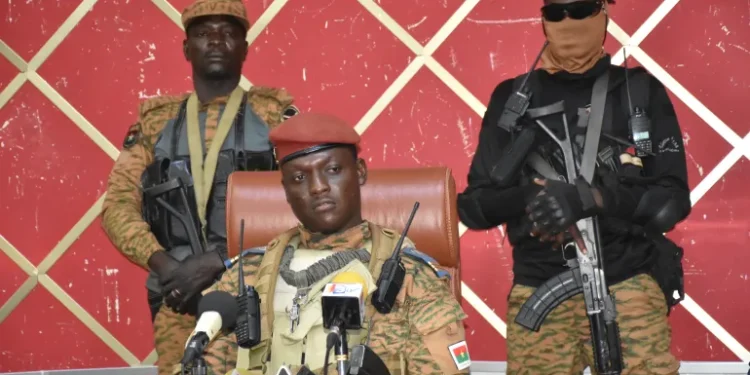In Burkina Faso, several senior military officers and a magistrate of the National Armed Forces have been discharged from the army, according to a decree signed by the President of Burkina Faso, Captain Ibrahim Traoré, on October 30, 2024.
They were discharged for two reasons: “misconduct deemed particularly serious, consisting of a grave attack on military dignity and the reputation of the army, characterised by an intention to bear arms against the State and harm national defence,” and “misconduct deemed particularly serious, consisting of a grave attack on military dignity and the reputation of the army, characterised by actions of intelligence with a foreign power and terrorists with the intent of furthering their undertakings against Burkina Faso.”
Among those discharged are the former President of the Transition, Lieutenant-Colonel Paul Henri Sandaogo Damiba; Lieutenant-Colonel Evrard Somda, former Chief of Staff of the National Gendarmerie; the former COTN (Commander of National Theatre Operations), Lieutenant Yves Didier Bamouni; and Lieutenant-Colonels Boubakar Keïta, Damandi Malick Toguyeni, and Wilfried Ouédraogo.
With the announcement of these discharges, many people are drawing connections to a statement made by the Burkinabe Minister of Security, Police Divisional Commissioner Mahamoudou Sana, on the evening of Monday, September 23, 2024, on national television. He said that the authorities had foiled several destabilization attempts. He mentioned names and revealed their modus operandi. These names included former President Paul Henri Sandaogo Damiba, and the Minister specified that there were “several other officers outside the country who are still under investigation.”
Several civil society organisations in Burkina Faso and neighbouring countries welcomed his announcement. Such is the case for the Confédération des peuples de l’Alliance des États du Sahel (CP-AES). This organisation, created on September 16, 2024, in Bamako, Mali, and comprising Burkinabes, Malians, and Nigerians, congratulated Captain Ibrahim Traoré and all the Burkina Faso authorities for “their firmness in the face of such serious acts.”
In their quest to “promote integration and African values characteristic of the peoples of the Sahel,” the CP-AES encourages “all the authorities of the AES confederation to join in the same dynamic to safeguard discipline, loyalty, and patriotism within the armed and security forces of the AES confederation.”
This news of the discharge of Burkinabe army officers is further proof that the regime of Captain Ibrahim Traoré is both coveted and controversial, marking yet another attempt at destabilization during the last two years of the current strongman’s reign.
Within the same week that the discharge list was published, it was revealed that an individual had approached soldiers intending to destabilise the country.
He offered them the sum of 5 billion FCFA. The soldiers reported this to their superiors, who instructed them to play along.
On Friday, November 8, 2024, the money was handed over in cash to the soldiers in suitcases. It was only then that the individual realized he had been duped. The money was deposited in the treasury, pending clarification of its origin, as a journalist explained on national television.
Having been given a five-year extension to lead the country following the recommendations of the May 25, 2024, national assembly held in Ouagadougou, after 20 months of transition, Captain Ibrahim Traoré is still not safe from a coup d’état.
The security situation remains unfavourable. Despite the acquisition of weapons and the results of military operations shown on public television, this regime does not appear to be convincing many people.
Under Ibrahim Traoré, there is no longer any official communication on terrorist attacks in Burkina Faso. This strategy of not acknowledging terrorism publicly does not seem to reassure everyone. Some activists, generally based outside the country, continue to share information related to terrorist incidents.
Since March 2023, the National Council for Emergency Relief and Rehabilitation (CONASUR) has stopped publishing statistics on Internally Displaced Persons (IDPs). Non-governmental organisations (NGOs) have also been asked to cease reporting on their humanitarian activities in the field. This makes it difficult to scientifically assess the positive or negative evolution of the humanitarian crisis linked to insecurity.
One constant reality is that, in several towns in Burkina Faso in regions severely affected by insecurity, it is difficult to move around within a radius of more than ten kilometres. This is the case in Kaya, Fada N’Gourma, Ouahigouya, and other areas.






























